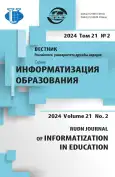The use of animation tools in the media space of the “Library Night” for the development of master’s students’ teamwork skills
- Autores: Mamaeva E.A.1, Gribkov D.N.2, Matveev V.V.2, Masharova T.V.3
-
Afiliações:
- Vyatka State University
- Orel State Institute of Culture
- Moscow City University
- Edição: Volume 21, Nº 2 (2024)
- Páginas: 209-226
- Seção: EVOLUTION OF TEACHING AND LEARNING THROUGH TECHNOLOGY
- URL: https://journal-vniispk.ru/2312-8631/article/view/321368
- DOI: https://doi.org/10.22363/2312-8631-2024-21-2-209-226
- EDN: https://elibrary.ru/NRCWKR
- ID: 321368
Citar
Texto integral
Resumo
Problem statement . The modernization of library education involves the ability to use information tools, in particular computer animation, in working on projects. The maturity of teamwork skills largely determines the professional self-realization of multifunctional librarianship specialists. The study aimed at substantiating the effectiveness of using animation tools in the media space of the “Library Night” event to develop the teamwork skills of master’s students. Methodology . Theoretical and methodological analysis and generalization are used to determine the content and problems of developing teamwork skills in library and information education, and the inclusion of animation tools in the implementation of media projects. The Renderforest platform is used to develop didactic animation. The study involved 68 undergraduates from the Orel State Institute of Culture. The study of animation tools and their use for designing the media space of the library is implemented within the framework of classes in the discipline “Information Technologies in Science and Education”. The authors use V. Stefanson's methodology to assess the level of teamwork skills of master's students. With its help, the levels of their development, interconnected with personality qualities, are determined. For statistical processing, Pearson's chi-square test and Fisher's method (angular transformation) were used. Results . The ideas of a methodological approach are formulated, reflecting the necessary changes in the system of training specialists in library science, taking into account the digitalization of library and information services. The didactic potential of animation tools for improving the quality of library education, and, in particular, for developing the teamwork skills of undergraduates has been clarified: developing the ability to listen to the alternative opinions of other team members, accept the standards and values of the group, and follow the social and moral-ethical norms of the team. Statistically significant differences in the qualitative changes that occurred in the didactic system were determined. Conclusion . The use of animation tools in the media space of the “Library Night” event contributes to the development of teamwork skills among master’s students: new opportunities for collaboration and project activities, innovative work experience, etc. However, some factors complicate the process of team building in the media space of libraries: the lack of clear leadership in the library, the lack of communication between employees, the weak motivation, and low social status of the profession.
Sobre autores
Ekaterina Mamaeva
Vyatka State University
Autor responsável pela correspondência
Email: mamaevakathy@gmail.com
ORCID ID: 0000-0002-7721-8820
senior lecturer, Department of Digital Technologies in Education
36 Moskovskaya St, Kirov, 610000, Russian FederationDmitry Gribkov
Orel State Institute of Culture
Email: bibliotekar2005@mail.ru
ORCID ID: 0000-0002-3388-9526
Cand. Sci. (Educ.), Associate Professor, Head of the Department of Informatics and Records Management
15 Leskova St, Orel, 302020, Russian FederationVladimir Matveev
Orel State Institute of Culture
Email: rector@ogik.ru
ORCID ID: 0000-0003-2906-5716
Doctor of Economic Sciences, Professor, Acting Rector
15 Leskova St, Orel, 302020, Russian FederationTatyana Masharova
Moscow City University
Email: mtv203@mail.ru
ORCID ID: 0000-0001-5974-7748
Doctor of Education, Professor, Professor of the Department of Pedagogy, Institute of Pedagogy and Psychology of Education
4 Vtoroy Selskohoziajstvenny Proezd, Moscow, 129226, Russian FederationBibliografia
- Zheng X, Lang A, Ewoldsen DR. The measurement of positive and negative affect in media research. Routledge; 2021. p. 48-66. http://doi.org/4324/9780429465758-4
- Gendina NI, Kosolapova EV, Rodionova DD, Ryabtseva LN. Digitalization of museums and the need to form an information culture of museologists. Tomsk State University Journal of Cultural Studies and Art History. 2021;43:231-221. (In Russ.) http://doi.org/10.17223/22220836/43/19
- Dolgireva A, Balina T, Levitskaya A. Multimedia Brochure Taganrog - the Cultural Capital of the Don (Virtual Open-air Museum). International Journal of Media and Information Literacy. 2022;7(1):48-59. http://doi.org/10.13187/ijmil.2022.1.48
- Mikhalchuk NE. The library QR-projects in digital space. Scientific and Technical Libraries. 2021;9:91-102. http://doi.org/10.33186/1027-3689-2021-91-102
- Onunga J. Applications of information communication technology (ICT) in academic libraries: an overview of Turkana University College Library. Open Journal for Information Technology. 2021;4:35-40. http://doi.org/10.32591/coas.ojit.0402.01035o
- Bender SM. Coexistence and creativity: screen media education in the age of artificial intelligence content generators. Media Practice and Education. 2023;24(1):1-16. http://doi.org/10.1080/25741136.2023.2204203
- Grakova EV, Maslakova MV, Dolganova TG. Value orientations of generations of employees and library organizational culture. Knowledge. Understanding. Skill. 2020;(2):136-145. (In Russ.) http://doi.org/10.17805/zpu.2020.2.12
- Gendina NI. Media education in the library sphere: the basis for implementing of the new direction of training and learning media and information literacy of citizens in the library. Media. Information. Communication. 2017;(21):1-10. EDN SFCTED. (In Russ.)
- Belyaeva NE, Esipov AL. Library education in the context of digitalization. Bulletin of the St. Petersburg State Institute of Culture. 2023;(2):143-149. (In Russ.) http://doi.org/10.30725/2619-0303-2023-2-143-149
- Redkina NS. Digital competencies of librarians in the ecosystem of Open Science. Bibliosphere. 2023;(2):25-34. (In Russ.) http://doi.org/10.20913/1815-3186-2023-2-25-34
- Saratovtseva N, Kozlova O, Vaganova O, Chernei O, Smirnova Zh. Formation of bachelors’ competence readiness to work in a team. Propósitos y Representaciones. 2021;9(SPE1):e807. http://doi.org/10.20511/pyr2021.v9nSPE1.807
- Salynina SU. Innovative practices in animation activities of institutions for additional education for children. International Research Journal. 2023;(11):1-5. (In Russ.) http://doi.org/10.23670/IRJ.2023.137.92
- Sukiasyan ER. Library magistrature. Its impact on the fate of library education in Russia. Scientific and Technical Libraries. 2017;(10):69-80. EDN ZKAOBT. Сукиасян Э.Р. Библиотечная магистратура и судьба библиотечного образования в России // Научные и технические библиотеки. 2017. № 10. С. 69-80. https://doi.org/10.33186/1027-3689-2017-10-69-80
- Pagore RB, Singh UK. Role of ICT in developing skills among library professionals with respect to digitalization of selected colleges and universities in Maharashtra. IP Indian Journal of Library Science and Information Technology. 2022;7(2):75-80. http://doi.org/10.18231/j.ijlsit.2022.014
- Tunay M. A new approach model of e-visual career application in distance education. American Journal of Science & Engineering. 2020;1:9-15. http://doi.org/10.15864/ajse.1402
Arquivos suplementares









